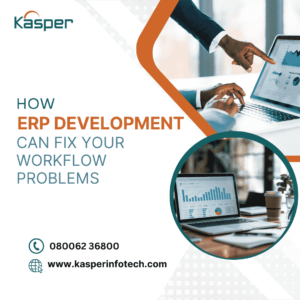

In today’s fast-paced business environment, managing operations efficiently is crucial to success. Whether you’re a small business owner or running a large enterprise, you’ve likely encountered workflow problems that slow down productivity. Enter ERP development — a game-changing solution that can streamline processes, reduce errors, and significantly improve overall efficiency.
What is ERP Development?
Enterprise Resource Planning (ERP) systems are software platforms designed to manage and integrate the core business processes of an organization. ERP development involves creating custom solutions that cater specifically to your business needs. Unlike off-the-shelf ERP software, custom ERP systems are tailored to fit your unique workflow, ensuring that every aspect of your business is optimized for performance.
How Workflow Issues Are Fixed by ERP Development
Centralized Data Management: The absence of a unified data system is one of the main causes of workflow problems in enterprises. Data that is spread over several departments can be difficult to obtain and analyze. ERP development centralizes all your company’s data and gives authorized staff members easy access to it with just one ERP login. As a result, fewer systems are required, and managing and collecting data takes less time.
Automation of Repetitive Tasks: Manual procedures take a lot of time and are prone to mistakes. Data entry, billing, and inventory management are just a few of the repetitive operations that can be automated with custom ERP implementation. By focusing on more strategic activities, your employees’ time is freed up by this automation, which boosts overall productivity. The best ERP software includes features like automated workflows and reminders, ensuring that nothing falls through the cracks.
Improved Communication and Collaboration: Miscommunication is a common culprit behind workflow problems. In a traditional setup, departments often operate in silos, leading to delays and misunderstandings. ERP software fosters better communication by providing a platform where all departments can collaborate seamlessly. For instance, when the sales team updates a client’s order status, the warehouse team is immediately notified, ensuring timely order fulfillment.
Real-Time Data Analysis Decision-making in business is only as good as the data it’s based on. Many companies struggle with outdated or inaccurate information, leading to poor decisions. Enterprise resource planning systems offer real-time data analysis, allowing you to make informed decisions quickly. With a custom ERP system, you can track key performance indicators (KPIs) and generate reports instantly, helping you stay ahead of the competition.
Scalability for Business Growth As your business grows, so do your workflow complexities. Off-the-shelf ERP software might not scale well with your expanding operations. However, custom ERP development ensures that your system grows with your business. Whether you’re adding new product lines, entering new markets, or increasing your workforce, a scalable ERP system will adapt to these changes without compromising efficiency.
Enhanced Customer Satisfaction: Efficient workflows lead to better customer experiences. With an ERP for small businesses, you can manage customer orders, track shipments, and handle returns more efficiently. The improved accuracy and speed of your operations will not go unnoticed by your customers, leading to higher satisfaction and repeat business.
Cost Savings: While the initial investment in ERP development may seem high, the long-term cost savings are significant. By streamlining your processes and reducing errors, you’ll save on operational costs. Moreover, the automation of tasks reduces the need for manual labor, further cutting down expenses. Over time, the increased efficiency and productivity will more than justify the investment in an ERP system.
Choosing the Best ERP Software for Your Company
There are differences between all systems when it comes to ERP development. It’s important to take support, scalability, customization choices, and ease of use into account when selecting the best ERP software. Working with a development team that can customize the ERP system to solve your unique workflow issues and comprehend your business needs is crucial.
An ERP system with an easy-to-use interface and reasonable cost is essential for small enterprises. Many small business ERP solutions provide modular features, which let you start with the essentials and add additional features as your company expands.
ERP Development Implementation in Your Company
Although implementing an ERP system is a major task, the advantages greatly exceed the difficulties with careful design and implementation. Determine which important sections of your workflows are the least efficient first. In close collaboration with your ERP development team, create a system that tackles these problems.
Another essential component of the ERP system’s successful implementation is employee training. Make sure that every user is familiar with the ERP login procedure and knows how to utilize the software’s numerous functions. Your development team’s continued assistance and regular upgrades will keep the system operating efficiently.
Conclusion
In conclusion, ERP development provides a solid answer to a lot of typical workflow issues. A customized ERP system may revolutionize your company’s operations through data centralization, task automation, enhanced communication, and real-time analytics. Investing in the best ERP software that meets your demands will boost customer happiness, save costs, and increase efficiency whether your company is small or large.
Don’t let issues with workflow hinder your company’s progress. Now, think about putting in place a custom ERP system and see how much more productive you become.







Полезные советы по безопасной покупке диплома о высшем образовании